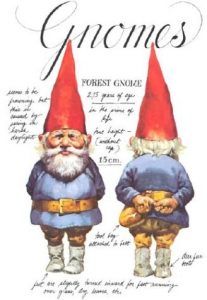
9 Nonfiction Titles that Should Exist (but Don’t)
Here’s a reading dilemma: sometimes the book you want to read next just doesn’t exist.
Yet.
Among the books I’ve craved to read (and the projects I’ve dreamed of undertaking myself) are these nine (currently) imaginary titles—projects ripe with potential, but that are not yet a reality. Someone pen them, please?*
(*except #2. #2 is mine, damnit.)
A Feminist History of Tupperware: A Tupperware history exists, but it’s not the one I want. I love vintage Tupperware, and I know I’m not the only one. But did you know that there’s much more nuance to the tale of Earl Tupper turning plastic sludge into gold than fits in a simple “buy my wares” party invitation?
A debate rages about whether or not Tupperware parties were actually a huge step forward for women’s financial independence, and that’s fascinating to me. (Nope, I’m not just trying to justify my odd collection of bright plastic tumblers and lettuce savers.) I crave a rich cultural biography that enlivens women’s stories from Tupperware parties past and present—of women making their own way; of business challenges; now, of collecting. There are nonfiction authors who could do this in a lively way! Pretty please?
A Travelogue following Historical Markers Across the U.S.: given endless free time and money, I would totally do this myself, but for now I just have to dream about it. You know all of those not terribly well kept up historical markers that pepper small towns all over the States? I’d love to get in my car, travel backroads, happen upon them by chance, and then touch base with locals in diners and pubs and such to chat casually and see just how much of that history is still present in the lives of their towns. Let’s talk history at a microcosmic level; let’s find it in the stories that even the folks next door seem to have forgotten about (and let’s have some good ol’ diner pie along the way.).
A Coffee Table Book of Bad Art The walls of my home are crowded with canvases and framed prints about which kind visitors say things like “well, if it makes you happy…” I’ve dubbed my space the Gallery of Questionable Art, and always think fondly of Davis Square’s Museum of Bad Art when I rescue a new piece from a thrift store bin. Wouldn’t it be wonderful to collect 2D versions of these marvels in a full color, large scale, glossy coffee table book? I think so.
Dirty Laundry: A collection of candid photographs of celebrity laundry rooms, far in to their “should I buy new underwear at this point, or just do the wash already?” phases. I want Annie Leibovitz to take the pictures when nobody’s looking—I know she’d catch the angles that no Hollywood giant would want us to see, ooky marks and all.
A Cultural History of Breakfast: My brilliant chef boyfriend is a breakfast/brunch fiend; one of his first questions when traveling abroad is about what locals eat in the morning. He’s said that he would snap this book up—if it existed. In his conception, the text would move all around the world, photographing and fun-essay-commenting on what people in different places consume when they wake, as well as the context behind those choices.
Harry Burns’s Mother: And Other Unsung Historical Heroines: The 19th Amendment, which granted some women the right to vote, only narrowly passed. As the legend goes: Tennessee Congressman Harry Burns was seconds away from voting “no” when he got a telegram from his mother, who set him straight in no uncertain terms. He voted yes—and he gets all of the accolades for that. That’s total crap. I’d love a multi-woman biography that lauds the true heroes of unlikely historical victories, treating tough women on their own merits, and bringing them the fore for the credit t
Transcendent: The Story of an American Religious Movement: There are books that gather transcendentalists’ writings together. There are certainly books by individual transcendentalists available. But there is no story-rich, thoroughly-researched, lively, and encapsulating history of the movement itself, and I want one. Ideally, someone like Candice Millard, who brings even outwardly dry historical tales to vibrant life, would be the one to pen it; she’d tease the good humor, bold aspirations, and creativity out of the old records and make transcendentalism—a weirdly defunct nineteenth century movement celebrating the divinity in humanity and all living things—enrapturing once more.
Elves: In the late 1970s, Harry N. Abrams released two awesome mythical beings books, Faeries and Gnomes. They feature fantastic, colorful artwork accompanied by short, evocative, sometimes scary-story-flavored insights into worldwide myths around the daydreamy beings. I’ve loved my copy of Faeries since childhood; I only recently obtained Gnomes from an antique store. But, uh: elves are my favorite. Why no elves, Abrams?! Get Brian Froud’s pen cranking again, please.
An Illuminated 25th Anniversary Edition of Pale Blue Dot: Carl Sagan’s book is holy. Holy. Fight me (or don’t—I’m right, anyway, and I don’t want to fight).
This beautiful volume—already flush with lovely, awe-inducing photographs in its earlier versions—warrants the careful attention devoted to other sacred texts throughout history. Dear Random House: Get out the gold leaf, hire some artists skilled in iconography, and paint this beauty up, please, for a 2019 anniversary edition.
What currently fictitious nonfiction book would you most like to see in print?
















